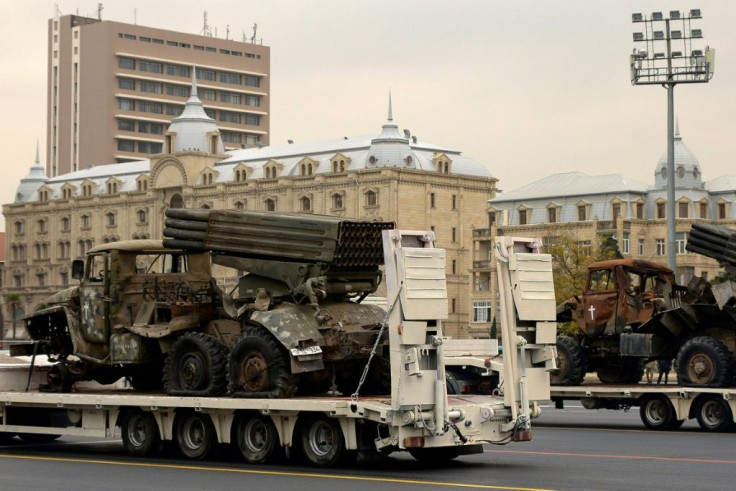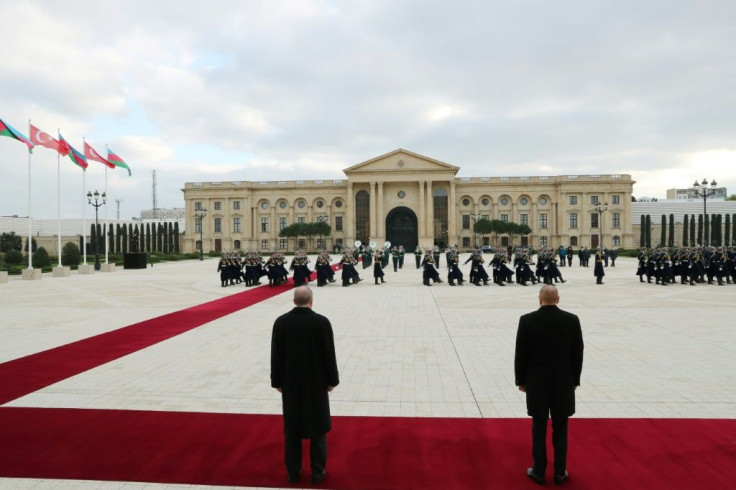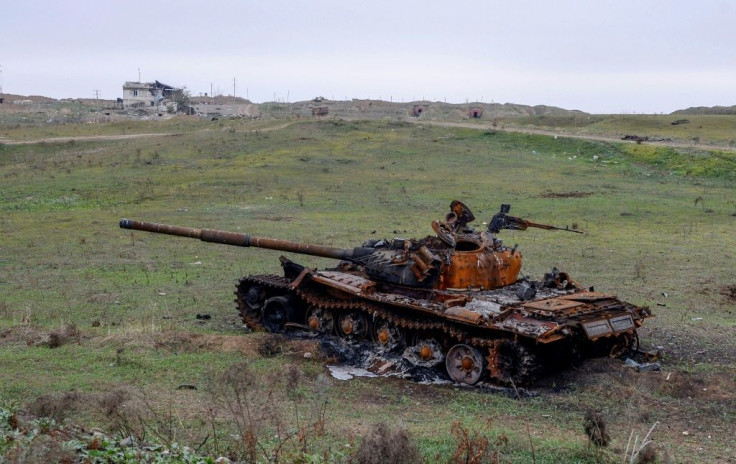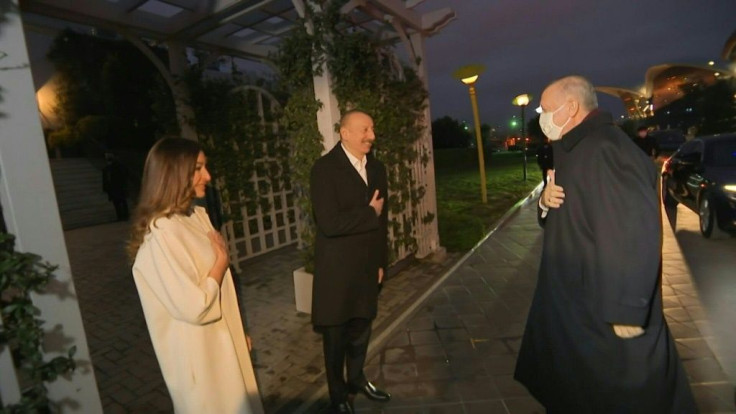In Baku, Erdogan Hails Azerbaijan's 'Glorious' Win Over Armenia
Turkish President Recep Tayyip Erdogan said on a visit to Azerbaijan Thursday that Baku's struggle with Armenia was not over, as he hailed his close ally's "glorious victory" in a bloody conflict with Yerevan.
Erdogan arrived in Baku to attend nationwide celebrations marking Azerbaijan's military triumph over Armenia in six weeks of fighting over the disputed Nagorno-Karabakh region.
Turkey backed Azerbaijan during a conflict that erupted in late September and left more than 5,000 people dead.
Azerbaijan's win against Armenian separatists in Karabakh last month was an important geopolitical coup for Erdogan who has cemented Turkey's leading role as a powerbroker in the ex-Soviet Caucasus region the Kremlin considers its sphere of influence.

In Baku, Azerbaijan's army paraded military hardware and weapons seized from Armenia, and Turkish drones were also on full display. Hailing the parade, Turkish television announced that Turkish drones "turned the tide" of the Karabakh war.
"We are here today to... celebrate this glorious victory," Erdogan said during the parade, the culmination of festivities marking Azerbaijan's victory.
"Azerbaijan's saving its lands from occupation does not mean that the struggle is over," he added.
"The struggle carried out in the political and military areas will continue from now on many other fronts."

National anthems of Azerbaijan and Turkey were performed ahead of the military display that was reviewed by Erdogan and his Azerbaijani counterpart Ilham Aliyev.
Erdogan's attendance "shows to the whole world the unbreakable friendship of the Azerbaijani and Turkish peoples," Aliyev said, adding that Erdogan's support "from the first days of armed actions emboldened the Azerbaijani people."
"Armenia was brought to its knees and capitulated," he said.
More than 3,000 troops took part in the parade, which was also attended by 2,783 Turkish military personnel -- symbolically matching the number of Azerbaijani servicemen killed in clashes. A Turkish commando unit was also in attendance.

None wore masks against the coronavirus despite Azerbaijan facing a dramatic spike in new daily cases that followed the outbreak of hostilities.
During a joint press conference with Aliyev after the parade, Erdogan criticised the so-called Minsk Group -- co-chaired by France, Russia and the United States -- which has led talks seeking a solution to the Karabakh conflict for decades but failed to achieve a lasting agreement.
The recent fighting persisted despite efforts by the Minsk Group to broker ceasefires that collapsed as Azerbaijan and Armenia accused each other of violations.

Moscow eventually brokered last month's peace agreement, and Erdogan on Thursday praised Russian President Vladimir Putin's "positive approach".
He also proposed a new six-country format of regional cooperation to bring about lasting peace in the region.
"Russia, Turkey, Azerbaijan, Iran, Georgia and if they accept, Armenia could join in this platform... to restore regional peace," Erdogan said.
"If a positive step is taken, we will open our closed doors," Erdogan added, referring to the Turkish-Armenian border that Ankara shut in 1993 when the two countries cut diplomatic ties.
Ankara was widely accused of dispatching mercenaries from Syria to bolster Baku's army, but denied the charge.
Under the Moscow-brokered agreement -- which leaves Karabakh's political status in limbo -- Armenia ceded control over parts of the enclave it lost during the fighting and seven adjacent districts it had seized during a war in the 1990s.
Nearly 2,000 Russian peacekeepers are being deployed for a renewable five-year mandate and the truce will be monitored in Azerbaijan by Turkey's military.
Separatists in Karabakh broke away from Baku in a war in the early 1990s that left some 30,000 people dead and displaced tens of thousands of Azerbaijanis.
Their claim of autonomy has not been recognised internationally, not even by Armenia.
On Thursday, Amnesty International said Azerbaijan and Armenia must urgently probe "war crimes" committed by both sides during the clashes.
Armenia accused Turkey of direct involvement in the fighting, claims dismissed by Baku and Ankara.
Armenia fights to recognise as genocide the World War I massacres of some 1.5 million Armenians in the Ottoman empire. Turkey has rejected the label.
Referred to as "one nation, two states," Turkey's alliance with Turkic-speaking Azerbaijan was forged following the Soviet Union's collapse in 1991 and has deepened under Erdogan's tenure.
Turkey has helped Azerbaijan train and arm its military. Azerbaijan for its part links NATO member Turkey with ex-Soviet nations in Central Asia and with China.
© Copyright AFP 2024. All rights reserved.





















